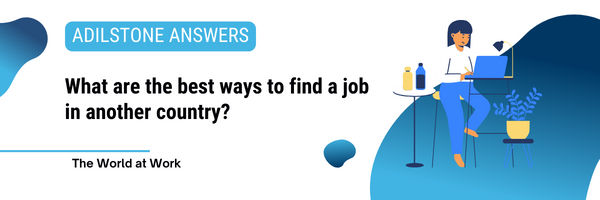What are the best ways to find a job in another country? | Adilstone Answers
- See the World at Work What are the best ways to find a job in another country? | Adilstone Answers

Finding a job in another country can be a challenging yet rewarding experience. Here are some of the best strategies to help you secure employment abroad:
- Research Work Visas and Permits: Before starting your job search, understand the visa and work permit requirements of the country you're targeting. Some countries have special agreements that allow citizens from certain countries to work without much hassle, while others have strict regulations.
- Utilize Job Search Engines and Websites: Websites like LinkedIn, Glassdoor, Indeed, and Monster often have international job listings. There are also country-specific websites that might offer a larger selection of local job opportunities.
- Contact Recruitment Agencies: Many countries have recruitment agencies that specialize in placing foreign workers. Research agencies in your field and reach out to them.
- Apply Directly to International Companies: Many multinational companies have positions around the world. Check their career pages regularly and consider applying directly.
- Consider a Transfer: If you're currently working for a multinational company, inquire about opportunities to transfer to an office in another country.
- Teach English: In many non-English speaking countries, there's a high demand for native English speakers to teach the language. This often requires a TEFL (Teaching English as a Foreign Language) certification.
- Work and Travel Programs: Some countries offer working holiday visas, which allow young people to travel and work in the country for a set period, usually a year.
- Volunteer or Intern: Programs like AIESEC offer internship opportunities abroad, while organizations like Peace Corps or VSO provide volunteer positions. This can be a way to gain experience and build connections in another country.
- Cultural Programs: Some countries offer cultural exchange programs where you can work in a specific sector (like being an au pair) while experiencing the culture.
Related Content




Comments